Nobel Laureate Urges Iranians To Boycott March 1 Elections

Narges Mohammadi, Nobel Peace Prize laureate and imprisoned human rights activist, has denounced the upcoming elections in Iran as "theatrical" and "staged managed."

Narges Mohammadi, Nobel Peace Prize laureate and imprisoned human rights activist, has denounced the upcoming elections in Iran as "theatrical" and "staged managed."
In a statement shared on her social media accounts on Saturday, Mohammadi declared that boycotting government staged elections is a "duty."
"I, along with the people, will aim to declare the Islamic Republic's lack of legitimacy and the oppressive regime's rift with the people by sanctioning the theatrical elections," stated Mohammadi.
“The Islamic Republic, with its ruthless and savage oppression, the massacre of the youth on the streets and the gallows, and the imprisonment and torture of the people, deserves national sanctions and global disgrace,” she added.
Government and independent surveys reveal a lack of public interest in the elections. According to a survey by the Islamic Republic of Iran Broadcasting (IRIB), 52% of people were unaware of the vothing date.
Mohammadi reiterated in her recent statement that transitioning from the dictatorial religious regime is a national demand and the only path for Iran, Iranians, and humanity's survival.
According to another survey, most Iranians plan to boycott the upcoming parliamentary elections, with 75 percent expressing a desire for government overthrow.
Conducted by the Netherlands-based Gamaan institute, the survey gathered data from 58,015 Iranian residents aged 19 and above over an eight-day period from January 31 to February 7. Titled "Iranians' Attitudes Toward the 2024 Elections," it represents a sample from 90% of the country's literate adult population.
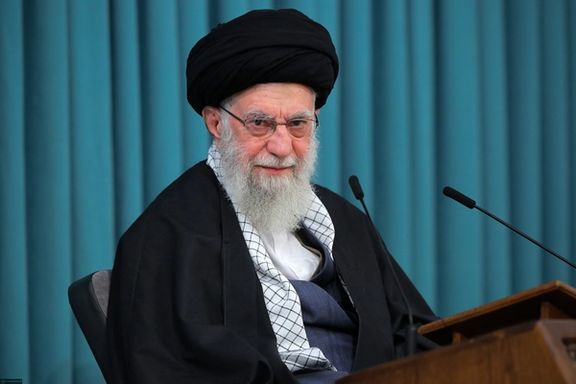
Amid expectations of a low turnout in elections on March 1, Iran’s Supreme Leader Ali Khamenei claimed “trusting the people” has been an integral part of the Islamic Republic.
What made the Islamic Republic "stable and progressive" and helped it overcome many "obstacles and conspiracies" was the combination of “trust in the people’s republic and Islam,” Khamenei stated on Saturday.
His remarks come against the backdrop of an unprecedented apathy among Iranians over the parliamentary and the Assembly of Experts elections which are to be held on Friday. Over the past weeks, Iran’s Supreme Leader has time and again made fervent appeals for voter turnout.
The elections are anticipated to witness historically low turnout, reflecting a crisis of legitimacy for the regime, particularly after the brutal crackdown of the nationwide uprising in 2022. Various political groups, including the Reform Front, comprising more than two dozen reformist parties, have declared their refusal to participate in the upcoming elections, citing concerns about its lack of competitiveness and fairness.
In another part of his speech, Khamenei lauded what he called “the staying power of resistance forces” in Gaza, further adding that “the enemies” have given up hope of destroying the Palestinian resistance.
“Axis of resistance” or “resistance forces” are labels the Iranian authorities employ to refer to Tehran’s proxies in the region, such as Hamas, Hezbollah, Hashd al-Shaabi in Iraq and Yemeni Houthis.
Despite Khamenei’s claims, reports from the ground indicate that Israel has annihilated a large part of Hamas’ operational and logistic capabilities in Gaza. According to the Israeli army, more than 10,000 Hamas militants have been killed or incapacitated in the Gaza war since October 7.

A study by the Ministry of Culture and Islamic Guidance reveals a significant decline in adherence to religious values, despite extensive ideological propaganda by the government in Iran.
The confidential study, conducted by the Ministry's Research Center for Culture, Art and Communication and leaked to foreign-based Persian media outlets, highlights that approximately 73 percent of Iranians advocate for the separation of religion from state, indicating an unprecedented demand for a secular government.
Contrary to the 22.5 percent advocating for a religious government, a sharp increase in secularism is evident, with demands for secular governance rising from less than 31 percent in 2015.
The significant change seems to have taken place since large anti-regime protests in 2022 and 2023 when the "Woman, Life, Freedom" movement began, representing the most serious challenge to the Islamic Republic in 45 years.
With participation from over 15,800 Iranians aged 18 and above across all 31 provinces, this is the fourth such study, following similar ones in 2000, 2003, and 2015.
Although the population's departure from the government's ideological values is shocking enough for the government, most of those taking part in the study have reiterated that Iranians are likely to be even less religious in the coming years.
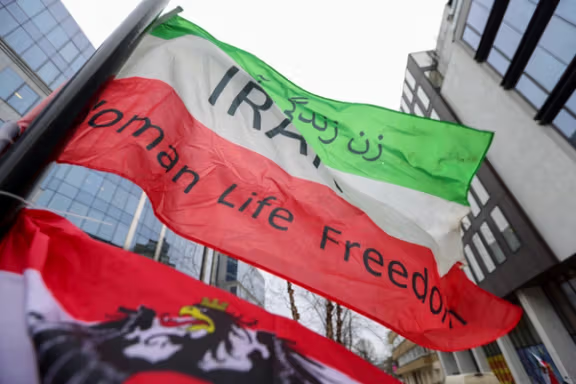
Moreover, nearly 62 percent of participants believe that ideological inquiries should not be part of employment exams, underscoring the societal polarization around religious and ideological matters under the clerical regime.
In one of the most important findings of the study, 85 percent said Iranians have become less religious compared to 5 years ago. Only 7 percent said they have become more religious and around 8 percent said they can see no difference in this regard between now and 5 years ago.
Looking ahead, over 81 percent anticipate a continued decline in religious observance over the next five years, reflecting shifting societal attitudes towards religious practices. Only 9 percent said they are likely to be more religious and around 10 percent said there will be no difference.
Regarding the compulsory hijab, attitudes have shifted markedly since 2015, with a substantial portion expressing tolerance towards women who defy the mandate. Only a minority now support strict enforcement of hijab rules. Around 38 percent said they do not mind if women defy the compulsory hijab, 46 percent said they oppose women who do not wear hijab but will not object to them.
The change since 2015 is significant. Some 10.6 percent had said in 2015 that they do not mind violation of compulsory hijab. Meanwhile, 34.4 percent said compulsory hijab rules should not be imposed on women who do not like it. The figure was 15.7 in 2015. On the other hand, 7.9 percent said they absolutely agree that women must be made to wear hijab whether they like it or not. The figure was 18.6 percent in 2015.
Only 11 percent of those who answered the questionnaire said they always take part in congregational prayers while 45 percent said they had never attended Friday prayers. As opposed to 13 percent who said they always read the holy Koran, 19 percent said they never read it.
The figures show why the Iranian government was reluctant to publish the results of the study although several journalists during the past week called on the government to make it available to the public. The reluctance of the Iranian government underscores its discomfort with the findings, which contradict its narrative of promoting piety. Instead, the data suggests a decline in adherence to religious values under clerical rule.
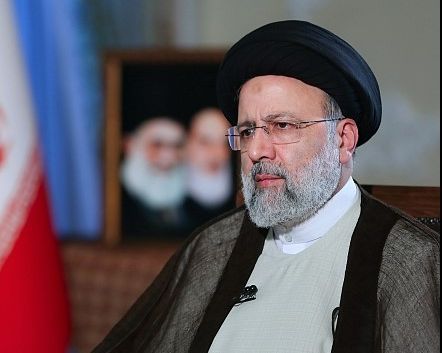
Iran's government has recently ousted numerous managers from their positions, citing "incompatibility in [their] performance with the discourse of the presidential administration."
Head of the Special Inspection Office of the presidential office, Hassan Darvishian, has announced the dismissal of "90 managers of executive organizations," noting that some were let go due to their actions not aligning with the government's positions.
Darvishian did not provide a breakdown of the dismissals based on the reasons he mentioned.
Hardliners dominating the Iranian government have been expelling officials and university professors who do not belong to their ranks, in a policy they call "purification."
The discourse of the Raisi administration, as outlined on the president’s website, is titled "Imam and Leadership Discourse," with the document referred to as the "Statement of the Second Step of the Revolution." The statement, issued by Supreme Leader Ali Khamenei in 2019 on the fortieth anniversary of the 1979 Revolution, has been scrutinized by critics who highlight the role of the Islamic Revolutionary Guard Corps (IRGC) in Iran's foreign policy as a central theme.
In an interview with ILNA, Darvishian claimed that the discourse of Ebrahim Raisi's government emphasizes "purity, anti-corruption, and populism." He stated that decisions would be made if the performance of managers contradicts the discourse, emphasizing that significant actions have already been taken in this regard.
Despite the Raisi administration's assertions regarding the fight against corruption, numerous reports have surfaced revealing corruption within government departments and officials. One significant case was the Debsh Tea scandal, where the company profited from the sale of cheap foreign currency allocated by the government for importing tea and machinery at higher rates in the black market between 2019 and 2022.
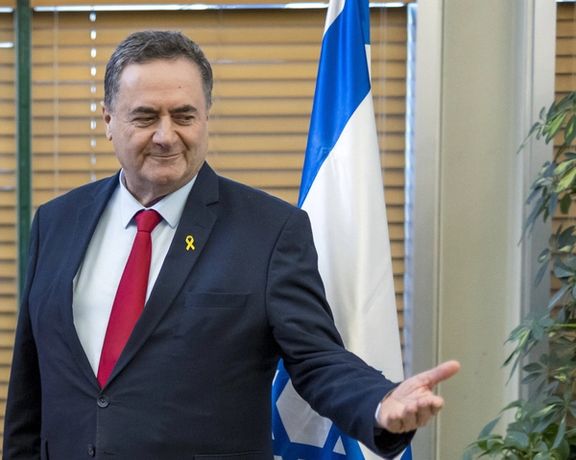
In a message to the United Nations Security Council, Israeli Foreign Minister Israel Katz has highlighted Iran's escalated weapons deliveries to Hezbollah through Syria.
Katz underscored Israel's right to protect its territory and citizens against such threats, emphasizing the urgent need for action.
Addressing the UNSC on Thursday, Katz condemned Iran's disregard for international resolutions, particularly citing violations of UNSC resolutions.
"Over the past months, while Israel is engaged in an ongoing armed conflict on numerous fronts, Iran is accelerating the pace of its weapons transfers to Hezbollah," wrote the foreign minister. "Iran is doing so by ground, using the porous Syrian-Lebanese border, as well as by air and sea, in violation of UNSCR 1701."
The shipments detailed in Katz's letter include components for air defense systems, various drones such as the Shahed-101 and Shahed-136, and diverse missile types including the Mini-Ababil and the 358 anti-aircraft interceptor. Katz highlighted specific units involved in the transfers, including the Islamic Revolutionary Guards Corps (IRGC) and Hezbollah factions, while also noting instances where Israel intercepted the shipments.
Responding to inquiries regarding the letter, Katz took to social media platform X on Friday, reiterating Israel's firm stance. "Iran is the head of the snake. We will not be patient much longer for a diplomatic solution in the north. If the dramatic intelligence information we revealed to the Security Council does not bring about change - we will not hesitate to act."
Iran provides significant support to Hezbollah, as well as several other groups in the region designated as terrorist organizations, including Hamas and Islamic Jihad in Gaza, and the Houthis in Yemen.
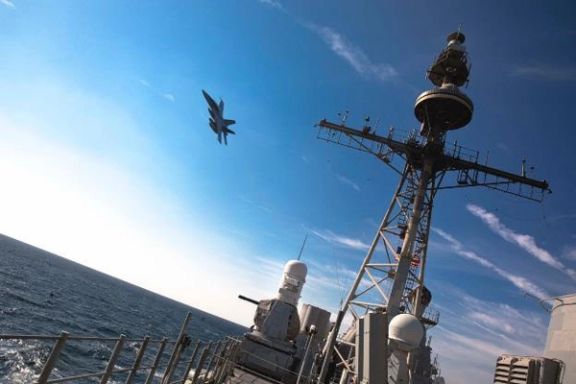
A commercial ship hit by Iran-backed Houthis on Monday has created an oil slick of almost 30 km in the Red Sea as it struggles to stay afloat despite damages.
The UK-owned Belize-flagged vessel, Rubymar, is “anchored but slowly taking on water,” according to the US military. It is carrying “over 41,000 tons of fertilizer,” which makes it a huge floating hazard, since a potential spillage could worsen the “environmental disaster” caused by the vast oil slick.
“The Houthis continue to demonstrate disregard for the regional impact of their indiscriminate attacks, threatening the fishing industry, coastal communities, and imports of food supplies,” read the statement by CENTCOM.
The Houthis, armed by Iran, have targeted dozens of ships since last November, hitting at least 20 and scaring away many more. They say their attacks are solely in support of Palestinians and in response to Israel’s onslaught on Gaza. However, in recent days, they have officially added British and American ships to their list of “legitimate” targets. The Houthi attacks began days after Iran's ruler Ali Khamenei called on Muslim nations to blockade Israel.
The two countries launched a joint operation against the Houthis on January 11, hitting dozens of targets in three rounds of airstrikes –the last of which took place this week. But neither the joint operation nor the near-daily, unilateral attacks by the US military have succeeded in stopping the Houthis.
President Biden and his team seem to be struggling to find the appropriate response, perhaps because they are reluctant to confront Iran’s Revolutionary Guards IRGC), which arms, trains and is even present on the ground, “serving side by side” Houthi forces.
“We know that the Houthis maintain a large arsenal,” Pentagon’s deputy press secretary Sabrina Singh told reporters Thursday, hours after yet another ship was hit by Houthis. “They are very capable, they have sophisticated weapons, and that’s because they continue to get them from Iran.”
Iranian officials have never denied their support for the Houthis, but they say they have no operational control over the group. Some experts suggest, however, that the Houthis rely on Iran for picking their targets. The information required for such operations, they say, is gathered by the IRGC, and by the spy ship Behshad, in particular.
Curiously, the number of Houthi attacks in the Red Sea has sharply risen in the past few days, coinciding with Behshad’s return to duty after 17 days docking at Djibouti port near a Chinese military base on shore. More Houthi attacks have been recorded in the last few days than in the previous 3 weeks combined.
The Biden administration issued a statement Wednesday, “condemning” the Houthis’ “reckless and indiscriminate” attack on commercial vessels in the Red Sea. “The Houthis are behaving like a terrorist organization,” the statement read, “and contrary to what the Houthis may attempt to claim, their attacks do nothing to help the Palestinians.”
Strong words aside, the administration’s plan for stopping the Houthis is unclear. A CNN report Friday suggested that “the group is continuing to fortify its weapons stockpile inside Yemen,” quoting a US official speaking on condition of anonymity.
US forces in the region have stopped some Iranian weapons getting to Houthi-controlled areas of Yemen, but some shipments have surely slipped through the net –and more will almost certainly do so, as long as the regime in Tehran sees no harm in trying,